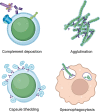Diverse Mechanisms of Protective Anti-Pneumococcal Antibodies
- PMID: 35155281
- PMCID: PMC8834882
- DOI: 10.3389/fcimb.2022.824788
Diverse Mechanisms of Protective Anti-Pneumococcal Antibodies
Abstract
The gram-positive bacterium Streptococcus pneumoniae is a leading cause of pneumonia, otitis media, septicemia, and meningitis in children and adults. Current prevention and treatment efforts are primarily pneumococcal conjugate vaccines that target the bacterial capsule polysaccharide, as well as antibiotics for pathogen clearance. While these methods have been enormously effective at disease prevention and treatment, there has been an emergence of non-vaccine serotypes, termed serotype replacement, and increasing antibiotic resistance among these serotypes. To combat S. pneumoniae, the immune system must deploy an arsenal of antimicrobial functions. However, S. pneumoniae has evolved a repertoire of evasion techniques and is able to modulate the host immune system. Antibodies are a key component of pneumococcal immunity, targeting both the capsule polysaccharide and protein antigens on the surface of the bacterium. These antibodies have been shown to play a variety of roles including increasing opsonophagocytic activity, enzymatic and toxin neutralization, reducing bacterial adherence, and altering bacterial gene expression. In this review, we describe targets of anti-pneumococcal antibodies and describe antibody functions and effectiveness against S. pneumoniae.
Keywords: Streptococcus pneumoniae; immune evasion; monoclonal antibody; opsonophagocytic; pneumococcal vaccination.
Copyright © 2022 Gingerich and Mousa.
Conflict of interest statement
AG and JM have applied for a provisional patent application covering human monoclonal antibody sequences for prevention and treatment of pneumococcal infection. The remaining authors declare that the research was conducted in the absence of any commercial or financial relationships that could be construed as a potential conflict of interest.
Figures


References
Publication types
MeSH terms
Substances
Grants and funding
LinkOut - more resources
Full Text Sources
Other Literature Sources
Medical

